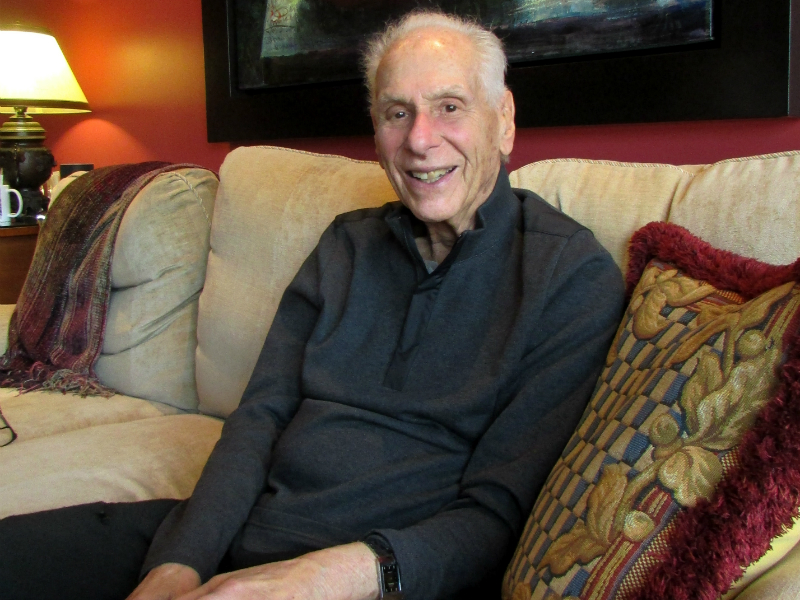Each week, Dr. Mervyn Gornitsky sees patients with complex dental issues, teaches, and engages in groundbreaking research that is being written up in medical journals.
He barely has time to notice that he will turn 90 on Feb. 23.
Gornitsky is director of dental research at the Jewish General Hospital (JGH), with which he has been affiliated since 1971. He has worked there full time for half his life, since 1975, when he became chief of dentistry, a position he held until 1998.
He is probably the longest serving medical professional on the JGH staff.
“Retirement is not a word in my vocabulary,” says Gornitsky, an oral and maxillofacial surgeon.
He did step down from active clinical practice in 2006, and since then devoted himself to research into the connection between oral and general health.
Too many dentists still focus on the teeth alone, he feels. “They work with blinkers; they don’t see the rest of the body.”
Until September, he was putting in “never under five days a week” at the JGH. Dialysis three times a week has forced him reluctantly to put in fewer days, but with no less enthusiasm.
One day a week he typically sees eight patients, but it is collaborating with neurologist Dr. Hyman Schipper that is keeping Gornitsky as eager as the graduate students he supervises.
Gornitsky had the foresight a dozen years ago to start a saliva bank, collecting the spit his patients provided in abundance.
Today, he has more than 4,000 specimens frozen at minus 80 degrees Celsius, the largest such bank in Canada.
That quantity of saliva has allowed his fellow JGH researchers to discover a biomarker that they believe will help diagnose Parkinson’s disease much earlier, even before such symptoms such as tremors begin.
Gornitsky explained that if a protein called heme oxygenase is detected in an unusually high amount in the patient’s saliva it could indicate onset of the disease.
“Here I was with all this spit around me, watching it go down the drain. I wondered whether I could use it to find out if there’s anything in saliva that could determine disease,” says Gornitsky.
Saliva is brimming with different types of chemicals that have yet to be explored for their connection to specific ailments, he points out.
These findings were just published in Movement Disorders, the official journal of the Movements Disorders Society.
Gornitsky’s hope is that eventually saliva will be the basis for an easy, inexpensive test that doctors can use right in their offices.
He also conducts research on chronic facial pain, sleep apnea and scleroderma.
In nominating him for the JGH Award of Medical Excellence, Schipper said, “Merv is a pre-eminent health care provider, scholar, teacher and humanitarian who has been serving his community passionately and unflaggingly for more than half a century … [He] is the consummate professional, a wonderful model for persons of all stages of life, a true humanitarian, and a great Canadian.
“I am confident he will continue, God willing, to make substantial contributions to the health and welfare of society both within and beyond our borders, and serve as a source of considerable pride to our community and country.”
The son of a dentist, Gornitsky graduated from McGill University, took advanced training at New York University, and began his own practice in 1956 before moving to the JGH.
Under his leadership, the JGH dental clinic became renowned both for teaching (he set up its residency program in general practice), while providing care at little or no cost to the needy.
“I believe that ethical considerations are as important as technique and diagnostic ability,” he says. “I told my students to be honest with their patients, to be accurate as possible in their diagnosis, to think of the whole patient and of their female patients as their mother and their male patients as their father.”
In 1977, Gornitsky opened the first dental service specifically to treat the Vietnamese refugees who were arriving in large numbers to Montreal.
“Nobody would touch them because quite a few were infected with hepatitis B – this was before the vaccine – dentists were not equipped to treat patients who were contagious. The clinic was set up in the hospital and we established [safety] protocols.
“I saw more than 2,000 patients over four or five years.”
That paved the way for the treatment of patients with the baffling new disease of AIDS/HIV in the early 1980s, when other dentists avoided them.
These patients often had horrendous oral problems, such as Kaposi’s sarcoma. Gornitsky reported at the eighth international conference on AIDS in 1992 on a novel treatment he had developed for the disease using human interferon and, controversially, Thalidomide.
Over his career, Gornitsky has received more than a million dollars in grants from various sources, and he keeps busy writing for more.
When Gornitsky was bestowed the honour of professor emeritus in 2002, the dean of McGill’s dentistry faculty, Dr. James Lund, stated Gornitsky “contributed more than anyone in Canada to the development of departments of dentistry in Canadian hospitals. Before Dr. Gornitsky, oral health care was rarely offered in university teaching hospitals. Now it is the norm.”
“What keeps my going? Curiosity, I maintain an interest in various areas, I love working with young people. Just keep doing things, that’s important at this point in time.”
